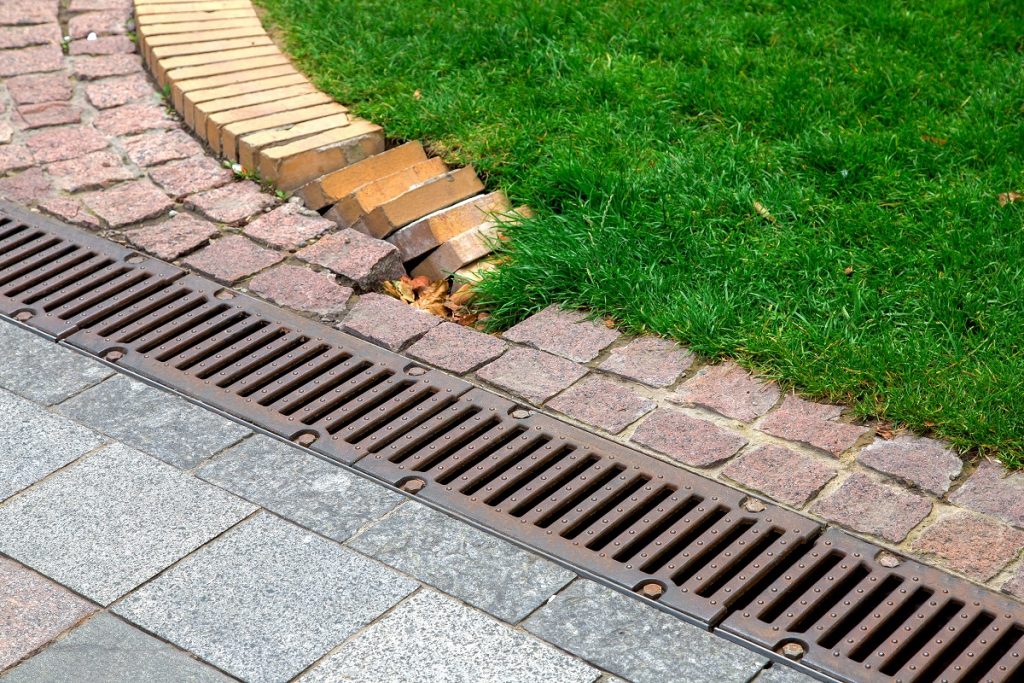- Install rain barrels to capture and store rainwater for your garden.
- Plant a rain garden in an area that collects water during storms to absorb runoff.
- Use permeable surfaces in place of concrete or asphalt on driveways, walkways, and patios.
- Redirect downspouts away from impermeable surfaces to reduce runoff.
- Utilize professional erosion control services if necessary.
As a resident of your neighborhood, it’s important to take measures to prevent water runoff. Not only can runoff cause erosion and soil loss, but it can also contribute to water pollution and flooding. By implementing the following strategies, you can help reduce water runoff in your community.
1. Install Rain Barrels
Rain barrels are an easy and cost-effective way to prevent water runoff. By collecting rainwater from your roof, you can use it for watering your plants and garden instead of letting it flow into the street. This not only reduces the amount of runoff but also helps to conserve water.
Here are tips for installing rain barrels:
Select and Purchase a Rain Barrel
Choosing the right rain barrel for your needs is key to a successful installation. Consider the size, material, and features like overflow ports or sealed lids. Make sure you select one that fits in your space and meets all local regulations. Once you have chosen a model, purchase it from the store or online retailer.
Install the Downspout Diverter
The downspout diverter will direct water from the gutter into your rain barrel instead of out onto the ground. Depending on your system type, there are several different ways to install this diverter—consult an expert if you’re unsure how to proceed.
Assemble and Install the Barrel
Once you have the barrel, assemble it following the manufacturer’s instructions. Then attach the downspout diverter to your gutter system, and place the rain barrel on a sturdy platform such as cinder blocks or a wooden stand. Ensure it is level and secure so water doesn’t spill out.
Connect Your Rain Barrel to an Irrigation System
If desired, you can connect your rain barrel to a drip irrigation system or garden hose for easy access to water during dry spells. Depending on your irrigation system, you will need PVC pipe or other tubing for this step. You will also need a drill and other tools to make the connection. Consult an expert if necessary.
2. Plant a Rain Garden

Another effective way to prevent water runoff is to plant a rain garden. A rain garden is a shallow depression in your yard filled with plants that can absorb water. The plants in a rain garden are typically native species well-adapted to your area’s climate and soil type.
Choose a spot in your yard that collects water during a storm to create a rain garden. Then, you must dig a shallow depression and fill it with soil and compost. Finally, you can plant your rain garden with various plants that can handle wet and dry conditions.
3. Use Permeable Surfaces
One of the biggest contributors to water runoff is impermeable surfaces, such as concrete and asphalt. These surfaces prevent water from soaking into the ground and instead direct it to the nearest storm drain.
To reduce the amount of water runoff in your neighborhood, consider using permeable surfaces. Permeable surfaces, such as gravel or permeable pavers, allow water to soak into the ground instead of flowing into the street. These surfaces can be used for driveways, walkways, and patios.
4. Redirect Downspouts
Another way to prevent water runoff is to redirect your downspouts. Instead of letting your downspouts dump water onto your driveway or sidewalk, consider redirecting them to a rain barrel or a permeable surface. This will allow the water to soak into the ground instead of running off into the street.
You must purchase a downspout diverter or extension to redirect your downspouts. These can be found at most home improvement stores and are easy to install. Make sure to use a downspout extension designed for your type of downspout.
Consider connecting the downspouts directly to the drainage system if your yard has underground drainage. This will help direct water away from areas that may cause flooding or other damage. It will also reduce erosion and can help protect any nearby trees and plants.
5. Utilize Professional Erosion Control

If your neighborhood is experiencing significant erosion and water runoff issues, it may be necessary to utilize professional erosion control. Professionals can install systems such as retaining walls, rock-lined swales, and other measures to help prevent erosion and reduce runoff.
Choosing a reputable erosion control company with experience in your area is important. They will be able to assess your neighborhood’s specific needs and provide you with a customized plan to address your erosion and runoff issues.
In Closing
Preventing water runoff is important in protecting your neighborhood’s natural resources and preventing pollution. By implementing the strategies above, you can help reduce water runoff in your community. Remember, even small changes can make a big difference in preserving your environment for future generations.

